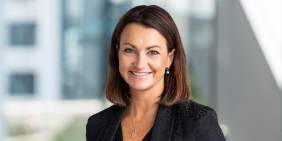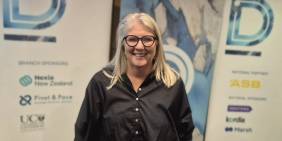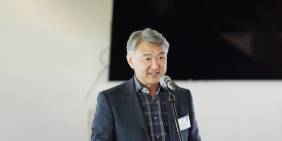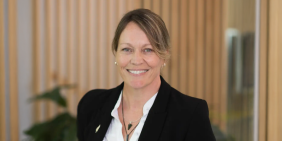
Believing and achieving – a Future Director on the rise
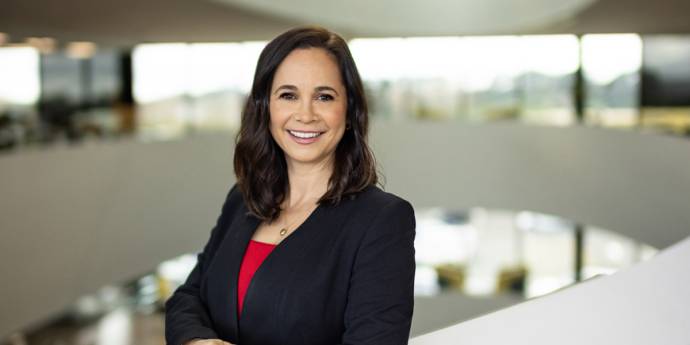
Instilled with the belief at school that she can achieve anything, Monique Forbes (Ngāti Hounuku, Tainui) CMInstD is determined to be the best version of herself that she can be.
Whether that is empowering young rangatahi, launching her own consultancy business, seizing governance opportunities, or being a solo parent, the Auckland-born and bred Forbes gives everything her best shot.
Her own empowerment started in the third form at her all-girls high school, where they were taught there was no limit to their thinking. “In our world, we came to believe there was nothing that existed that was going to stop us from succeeding. You can be whomever and whatever you want to be.”
But there was always that expectation of achievement. “Achievement looks different for different people,” she says, “but it was to be the best version of yourself that you can be. And, I guess, I have always tried to be that.
“One of my guiding principles is that I’m going to live my life to make the biggest difference I can within my capacity.”
Forbes has often been in the right place at the right time – when landing her first job and her first board role – but knows her knowledge, skills and experience are transferable, allowing her to work at different companies.
She has not been scared at jumping industries, whether that is in aviation, advertising, renewable energy, or utilities and financial services. It was at one of these companies that a CEO imparted some wisdom that led Forbes to her calling.
“He was an advocate of finding something in your personal life that is bigger than yourself. It’s not just about you. I was looking for what that could be and stumbled upon it while surfing the inet.”
Forbes watched a documentary named In the Zone, the story of American Terrance Wallace who in 2011 launched the InZone Project, aiming to transform the lives of disadvantaged Māori and Pasifika teens by moving them to supportive homes in zones where they could attend top Auckland schools.
“It just spoke to me and my immediate reaction was, ‘how do I get involved? This is where I can have an impact.’ I reached out to the chair and there happened to be an opening on the board at the time. I’ve been volunteering for nearly four years now.”
“With that super diverse, younger generation coming through, boards need to understand the value of diversity and not to feel threatened by it through a lack of knowledge or understanding.”
Forbes says it was not intentional to start her governance journey this way – it was more about trying to use her skill sets and knowledge to have an impact on the next generation coming through.
“To quote [sociologist and demographer] Professor Paul Spoonley, the demographics in New Zealand are changing and so will the leaders of tomorrow,” she says, citing statistics that, over the next two decades, almost 20 per cent of New Zealanders will be a member of an Asian community, more than 20 per cent will self-identify as Māori and another 11 to 12 per cent will identify as Pasifika.
“With that super diverse, younger generation coming through, boards need to understand the value of diversity and not to feel threatened by it through a lack of knowledge or understanding.”
Despite having no governance experience, Forbes was helped at InZone by a good onboarding process, and a strong chair who sat on multiple boards across many industries. “I was exposed to that best practice and learned a lot quickly,” she says.
“The chair ensured everyone around that table was heard. People were encouraged to speak up. Everyone had a unique viewpoint based on their background and experience. That environment created a safe space. It comes back to the culture of that board and the respect held for each other.”
Forbes also stepped off the board into an interim CEO position to fill a gap for five months, experiencing the operational side and reporting back to the board. “It just gave me a different perspective, I loved it,” she says.
“I love learning and sometimes having to unlearn things that have become outdated. It’s so important to have an open mindset, no matter at what stage you are at in governance and be brave enough to also unlearn and relearn.”
“I’m not overly risk adverse. If something goes wrong, try something else. What is the worst thing that can happen? Someone says ‘no’ or you get a rejection.”
She says she has always been “very ambitious”, and the pressure attached to that comes from within and her personality type.
“I have always set goals, rightly or wrongly – ‘By the time I’m X years old, I want to be this, this and this, in my professional career’. I’ve always been that type of person, but now I’ve realised you shouldn’t put age limits on yourself.
“I’m not overly risk adverse. If something goes wrong, try something else. What is the worst thing that can happen? Someone says ‘no’ or you get a rejection.”
That attitude served her well when looking for her first job. She showed up on spec at Qantas one day and handed her CV to the receptionist. By coincidence, the marketing coordinator had just resigned and they were looking for someone.
“The stars aligned for me that day. My CV landed on the marketing manager’s desk and that was my first job. My career just evolved from there.
“I was only seven months into that marketing role before I was promoted to business analyst, so I needed to learn how businesses were run. I was doing everything from market share analysis to revenue forecasting and planning.”
Realising that the major decisions were being made at head office in Sydney, Forbes crossed the Tasman and spent more than eight years working there.
For the past 24 years, she has worked predominantly in C-senior roles in big complex, publicly listed companies in Australia and New Zealand, with her last management position on the executive team at Heartland Group, specialists in finance and banking products.
“Once I’ve finished my management career, full-time governance is my ultimate goal,” she says.
Worlds came together at the CDC
Like many aspiring directors who attend the IoD’s Company Directors’ Course, Monique Forbes CMInstD wondered how the five days of intensive skills building would impact her career – and life.
The marketing, customer and digital executive leader, who joined the IoD Board as a Future Director in July, was surprised.
“To be honest, I didn’t really know much about the IoD as an organisation. But I had heard about the CDC and it turned out to be the most amazing ‘aha, connecting’ moment for me. It was the coming together of my worlds, learning more about what good governance means and the impact it can have on people, organisations, communities and the planet.
“Then, when I joined the IoD it felt like I had found my people. It is an organisation with an incredible vision and purpose. It has opened a new world for me. I would say I found my learning place – from the people I meet to the content that is produced, whether it is webinars, in-person events, toolkits or courses.”
After completing the CDC, she quickly went on to sit her Chartered Member qualification but says there are things she would have done differently in the first six months of her first board role – “Reading the constitution or deed as the first document!” she laughs. “It’s the 101 of starting on a new board.”
The IoD Board received 33 high-calibre applicants for its Future Director position, says Chair Ross Buckley CMInstD, with Forbes’ strategy, marketing and customer experience seen as a valuable addition to the skills already sitting around the table.
“Forbes was able to showcase her experience, competency, and mana from both her senior corporate and leadership roles, as well as her experience in governance on a ‘for purpose’ entity.
“She demonstrated great passion for the IoD which was supported by her recent Chartered Membership status and her attendance at numerous IoD events and courses – she is a model member,” says Buckley.
